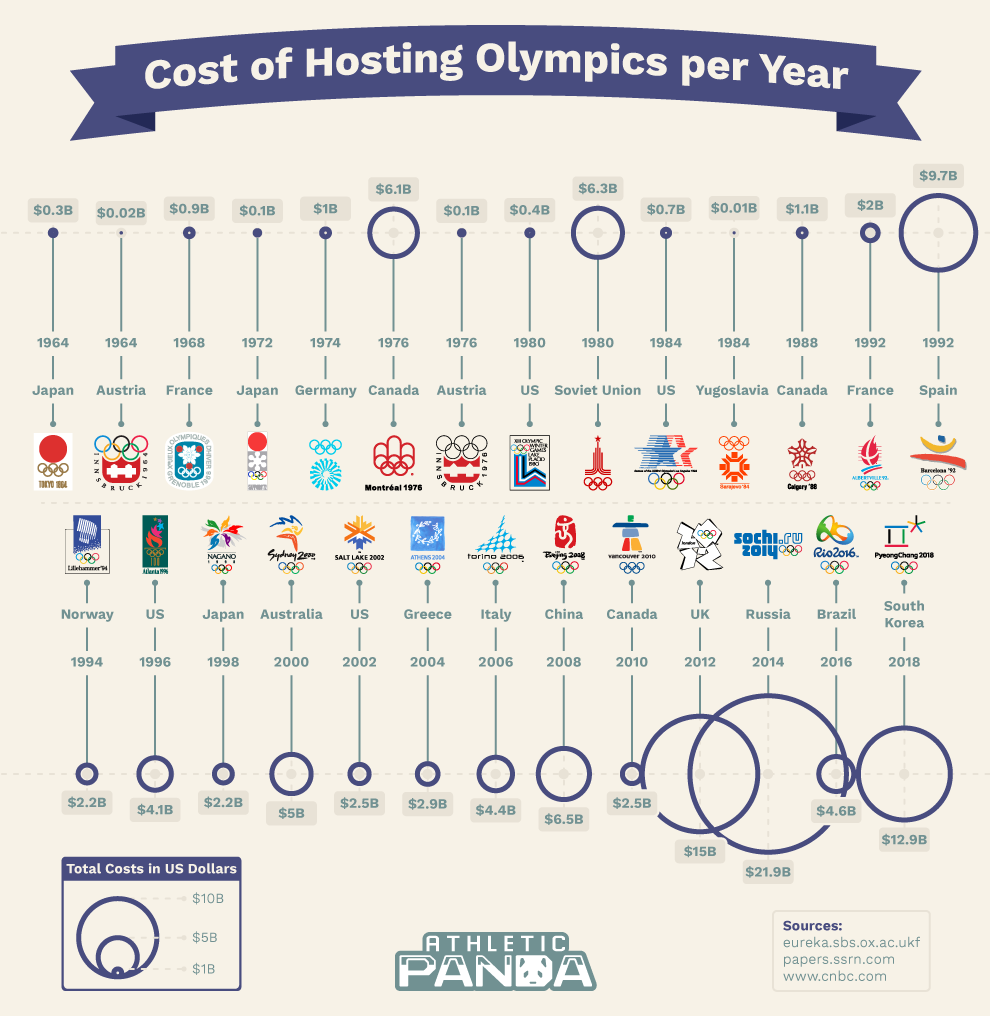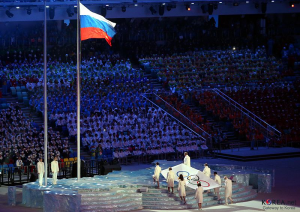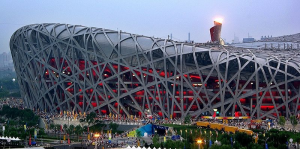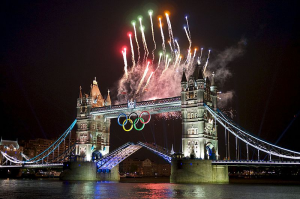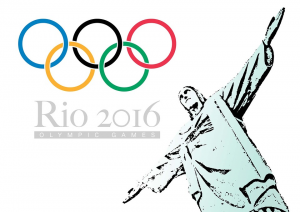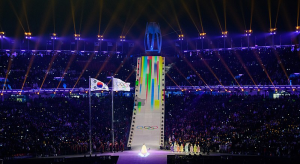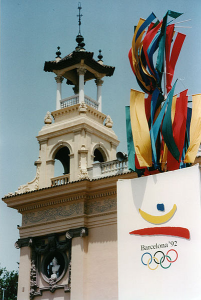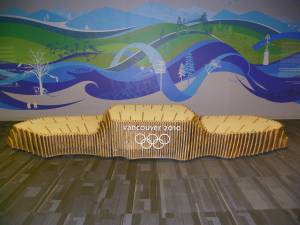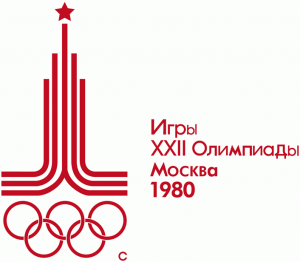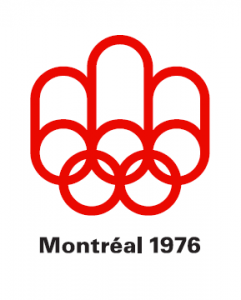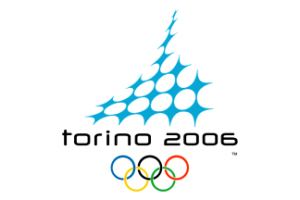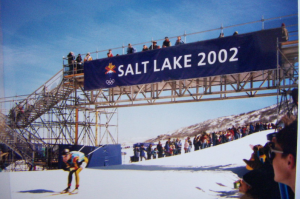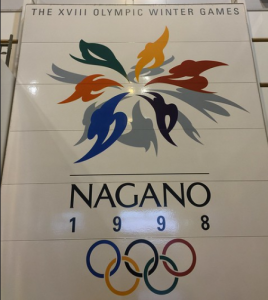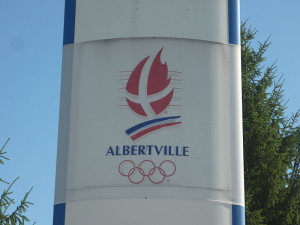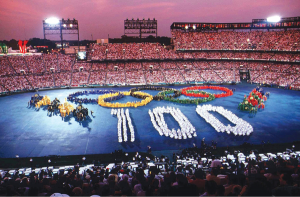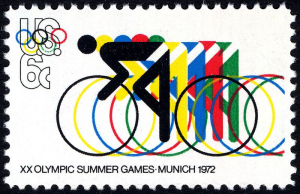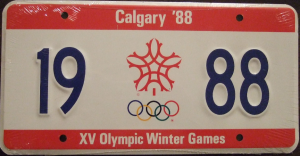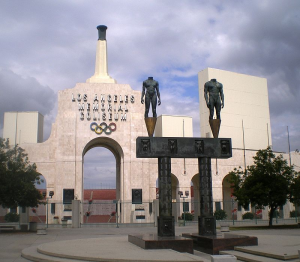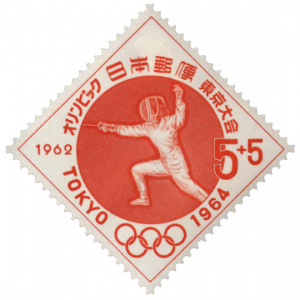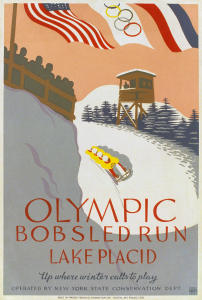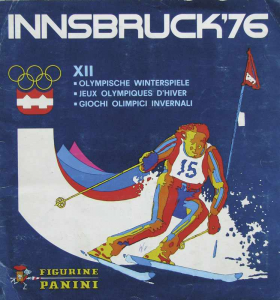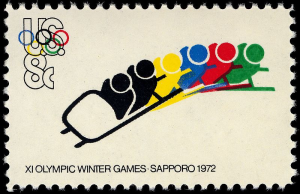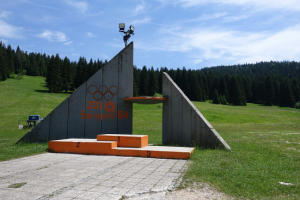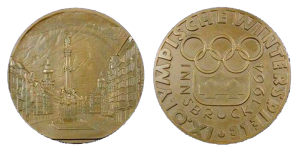Hosting the Olympics is the biggest honor a country could receive. But with great honor comes great responsibility and great sacrifice as well.
The thing is:
The Summer and Winter Olympics are the most expensive sports events in the world. Organizing either event takes years and involves hundreds of companies and thousands of people. So the cost of Olympics quickly ramps up.
What’s more:
The preparations typically involve the construction of costly new infrastructure including roads, hotels, stadiums, arenas, and so on. Sometimes, these investments attract tourists and help improve the everyday lives of locals, but sadly that’s not always the case.
To help you get a clearer idea of the massive sums involved, we’ve ranked the 27 most expensive Games ever (both summer and winter). Keep reading to find out how much their organization costs and what that money was spent on.
Cost of the most expensive Olympics:
1. Sochi Winter Olympics, 2014 – $55 Billion
(Source: Tandfonline)
The Sochi Winter Olympics of 2014, held in Russia, are by far the most expensive Olympic Games to date.
Check this out:
The estimated cost of $55 billion is higher than the combined total of all the other Winter Games held before. Before the games, Sochi was a popular beach town on Russia’s Black Sea coast. For the purposes of the games, it was completely transformed.
However, the Sochi Olympics cost has been well justified, as Sochi has been Russia’s biggest resort destination ever since.
2. Beijing Summer Olympics, 2008 – $40 Billion
(Source: Reuters)
In the second place, we have the most expensive Summer Olympics to date, held in Beijing, in 2008.
The cost of the 2008 Olympics is estimated at $40 billion. This sounds like a lot but didn’t affect China’s finances too much at the time.
This figure includes the construction of 31 Olympic Games venues based in Beijing, which began in May 2007. However, the Chinese government constructed additional venues outside of the capital as well, which helped develop some poorer parts of the country.
In the end, the economic boost China received makes the cost of the Beijing Olympics a small price to pay.
3. London Summer Olympics, 2012 – $14,6 Billion
(Source: BBC)
In total, London has hosted the Games three times—in 1908, 1948, and 2012. That makes London unique, as it is the first city to have accomplished such a feat.
These Olympics were attended by 10,768 athletes from 204 countries who competed in 302 events in 26 sports.
The preparation for the games included the redevelopment of a large number of existing venues, which made the positive economics of the Olympics questionable in this case.
For the purposes of the games, a massive 200-hectare Olympic Park was constructed and numerous venues were made more sustainable.
4. Rio de Janeiro Summer Olympics, 2016 – $13.2 Billion
(Source: Reuters)
Even though Brazil’s economy has been struggling for decades, the government still decided to host the Summer Olympics. In the end, this proved to be a huge bite, as the cost of the 2016 Olympics ended up being $13.2 billion, which is $4.4 billion higher than Rio’s entire budget.
In fact, the costs skyrocketed soon after the preparations for the games began. The officials had to expand the subway, renovate the port, clean up Guanabara Bay, and build an expensive doping laboratory.
5. Pyeongchang Winter Olympics, 2018 – $12.9 Billion
(Source: Forbes)
In 2018, South Korea proved that the cost of hosting the Olympics successfully did not have to break all the records. Compared to the previous Winter Olympics held in Russia, these ones were a bargain.
The $12.9 billion budget was spent on building the impressive Olympic Village, constructing a high-speed rail that connects Pyeongchang and Seoul, and a number of venues that were used for the duration of the games.
6. Barcelona Summer Olympics, 1992 – $9.4 Billion
(Source: WorldAtlas)
The Barcelona Summer Olympics of 1992 was one of the biggest sports spectacles at the time. So, it should come as no surprise that the estimated budget was overshot by 266% during the preparations.
In that case:
Do the benefits of hosting the Olympics outweigh the risks?
Experts believe that the answer is yes.
The 1992 Summer Olympics brought a lot of permanent jobs to the country and helped Barcelona become one of the most popular tourist destinations in the world.
7. Vancouver Winter Olympics, 2010 – $7 Billion
(Source: TheGlobeAndMail)
The 2010 Vancouver Winter Olympics are officially known as the XXI Olympic Winter Games. They were mainly held in Vancouver, British Columbia, Canada, but some events also took place in the surrounding areas of West Vancouver, Richmond, and Whistler.
If you’re wondering who pays for the Olympics, in this case, the majority of the funds came from non-governmental sources. Specifically, the auctioning of broadcasting rights and sponsorships covered the bulk of the costs.
8. Moscow Summer Olympics, 1980 – $6,3 Billion
(Source: Papers.ssrn)
(Image source: sportslogos.net)
The Moscow Summer Olympics are unique in being the first Games to be held in Eastern Europe. They were also the first Games to be held in a communist country and remained the only ones until the 2008 Games in China.
However, these were not the most financially successful Olympics. Due to the 1979 Soviet invasion of Afghanistan, most non-communist countries boycotted the games (though some allowed their athletes to compete under the Olympic Flag). Only 80 states attended in the end.
The $6.3 billion were mostly spent on:
- Operational costs
- Expenditures for technology
- Transportation
- Building the Olympic Village
- Constructing the venues
-
Montreal Summer Olympics, 1976 – $6.1 Billion
(Source: Papers.ssrn)
(Image source: olympic.ca)
If you want to find out more about the negative economic impact on Olympics host countries, the Montreal Summer Olympics are a great example.
With the total cost of Olympics reaching $6.1 billion, the Games were a complete disaster. It took the second-largest city in Canada 30 years to pay off the debt that ramped up during the preparations.
The biggest investment was the construction of the technologically advanced Olympic Stadium, which was still under construction when the Games began. Today, the venue is colloquially known as the “Big Owe.”
9. Sydney Summer Olympics, 2000 – $4.2 Billion
(Source: EdcUtah)
The Sydney Summer Olympics of 2000 is known as the Games of the New Millenium. They marked the second time the Games were held in Australia, the first being in 1956 in Melbourne.
Considering the economics of the Olympics, they were not the most successful ones. The initial budget was 90% higher than expected, which did not meet with public approval.
The majority of the funds were used to construct several venues in the Sydney Olympic Park, which did not have sufficient booking to cover expenses in the following years.
11. Turin Winter Olympics, 2006 – $3 Billion
(Source: BCBusiness)
(Image source: crwflags.com)
Turin was chosen to be the host of the 2006 Winter Olympics in 1999. This was the second time Italy hosted the Games after the 1960 Summer Olympics in Rome.
In 2006, the $3 billion invested in infrastructure and preparation had a big impact on the Italian economy. Especially since the estimated budget was overrun by at least 80%.
The high cost of Olympics, in this case, was due to the construction of 65 sporting facilities and venues. On top of that, the organizers had to reconstruct roads and rails, build Olympic villages, and expand existing hotels.
12. Athens Summer Olympics, 2004 – $2.9 Billion
(Source: CNBC)
(Image source: news.gtp.gr)
Athens was the city where the first modern Olympics of 1896 took place. This was an homage to the Ancient Olympics held at the city of Olympia in the Peloponnese every four years from 776 BC to 393 AD. The Greeks had to wait another 108 years to have this privilege for the second time, so the entire country was quite excited.
Now:
For the purposes of this grandiose event, the government spent almost $3 billion on infrastructure, the costliest of which was the Athens Olympics Stadium.
The preparations lasted for seven years and included the construction of a new airport as well as a subway system, tram services, rails, stadiums, and venues.
13. Salt Lake City Winter Olympics, 2002 – $2.5 Billion
(Source: ApNews)
The 2002 Salt Lake City Winter Olympics took place in and around Salt Lake City in Utah and hosted a total of 78 nations. 2,399 athletes competed in 78 events between February 8 and February 24.
The question of how much does it cost to bid for the Olympics caused a stir in the country, along with a bribery scandal during the bid.
The US Government invested $1.3 billion in infrastructure improvements, whereas the rest of the money came mostly from donations and sponsorships.
14. Lillehammer Winter Olympics, 1994 – $2.5 Billion
(Source: Papers.ssrn)
(Image source: fotw.info)
Lillehammer is a small Norwegian city that once had a lofty goal—to become one of the Olympic host cities.
Moreover:
It wanted to do it in a sustainable way and host the first “Green Olympics.”
For these purposes, the organizers spent $2.5 billion on the construction of venues that would integrate with the natural surroundings. Wherever possible, they used organic materials.
The best example of the Norwegian natural principle is the breathtaking ice rink built inside a cave. The city managed to cover just $289 million of the expenses, so the Norwegian Government had to step in to cover the rest.
15. Nagano Winter Olympics, 1998 – $2.2 Billion
(Source: JapanTimes)
As you know, the Japanese are famous for their high-speed trains. In fact, they are so good that they almost ruined the 1998 Nagano Winter Olympics.
Here’s how it all went down:
The government invested a lot of money in building a high-speed train which enabled the majority of the tourists to stay in Tokyo and travel to Nagano. That caused the local hotels to be empty and lose money.
While we don’t know the cost of Olympics tickets in Nagano, we know that 89.4% of them were sold, which is a pretty big success.
16. Albertville Winter Olympics, 1992 – $2 Billion
(Source: Papers.ssrn)
The Albertville Winter Olympics are unique in being the last Winter Olympics to be held the same year as the Summer Olympics. After that, the International Olympic Committee changed the system, separating the two with a two-year break in-between.
For the purposes of hosting these Games, the French government had to upgrade highways and rails, as well as build new hospitals and cultural centers.
Some of the most costly projects were the bobsled run at La Plagne ($44 million) and ski jumps at Courchevel ($33 million).
In this case, the cost of Olympics was also affected by the housing and feeding of athletes, which amounted to $92 million.
17. Atlanta Summer Olympics, 1996 – $1.6 Billion
(Source: SportsBusinessDaily)
The Atlanta Summer Olympics of 1996 is known as Centennial Games due to the fact that they were held exactly 100 years after the inaugural modern Games in Athens.
Even though the government spent $1.6 billion on hosting the games, they proved to be profitable. The city earned a lot through broadcasting rights, sponsorship deals, and ticket sales.
And that’s not all:
There was a positive social impact on the Olympic games as well. The Centennial Olympic Park led to a revitalization of the city’s downtown area.
18. Munich Summer Olympics, 1972 – $1 Billion
(Source: Papers.ssrn)
After Munich was chosen to become one of the Olympic cities, a massive construction campaign began in the area.
The main venues in which the majority of events took place included the Olympiapark and dozens of others across the Greater Munich area.
Sadly, the Munich Summer Olympics were remembered for more than sportsmanship. The Olympic spirit was overshadowed by the Munich massacre perpetrated by a terrorist group called Black September. They killed eleven Israeli athletes and coaches, as well as one police officer.
19. Grenoble Winter Olympics, 1968 – $888 Million
(Source: Papers.ssrn)
The 1968 Grenoble Winter Olympics are the last Games whose organization costs less than $1 billion. However, the $888 million spent was the highest cost of Olympics at the time.
Interesting fact:
The Grenoble Winter Olympics are also unique because the events were not held in the same area. Instead, the venues were spread around the surrounding area.
Almost half of the money used for infrastructural investments was used to build the new ice rink, which is known today as the Palais des Sports.
20. Calgary Winter Olympics, 1988 – $829 Million
(Source: TheCanadianEncyclopedia)
This was the third time the Canadian city of Calgary had applied to host the Games, and it finally got the honor of becoming one of the Olympic hosts.
The total cost of the 1988 Winter Olympics amounted to $829 million, which was considered rather cheap at the time.
The majority of the funding came from the government and the broadcasting rights. For example, ABC paid $309 million to show the Games in the US.
21. Los Angeles Summer Olympics, 1984 – $719 Million
(Source: Papers.ssrn)
The 1984 Los Angeles Summer Olympics marked the second time the Games were hosted in LA.
The majority of the countries of the Eastern Bloc, led by the Soviet Union and East Germany, boycotted the games as retaliation for the US-led boycott of the 1980 Moscow Games.
And yet:
The 1984 LA Games are considered to be the most financially successful Olympics ever. The government spent $719 million on organization but profited more than $250 million. This was the result of low construction costs and a reliance on private corporate funding.
22. Tokyo Summer Olympics, 1964 – $282 Million
(Source: Medium)
Hosting the 1964 Summer Olympics was incredibly important for Japan. It helped the nation show itself as peaceful and economically prosperous.
The entire country took this feat seriously, which is obvious in the fact that Tokyo spent the entire city’s budget on organizational costs.
The biggest expense prior to the 1964 Olympics was the famous Shinkansen train, which began operating nine days before the opening ceremony.
After the end of the games, the positive social impact of Olympic Games on Japan was evident, as the country continued to develop in every possible way – culturally, socially, and economically.
23. Lake Placid Winter Olympics, 1980 – $132 Million
(Source: TheSportDigest)
The cost of winter Olympics is usually higher than the cost of summer Olympics. However, that was not the case in 1980, when the USA spent significantly less than Russia on infrastructure and organization.
Even though the US spent “just” $132 million, there were still some costly investments. For example, the Alpine Ski Runs cost $15.5 million, whereas the Olympic Arena amounted to $14.9 million.
The government also built an entire complex for bobsled, ski jumps, and speedskating, which ended up making a dent of $16 million in the Olympics budget.
24. Innsbruck Winter Olympics, 1976 – $118 Million
(Source: Papers.ssrn)
Initially, Innsbruck lost the bid to host the 1976 Winter Games. Denver was the original host but chose to withdraw after the residents voted against the games. The reasons were environmental and financial in nature.
On a positive note:
Innsbruck was prepared to host the 1976 Olympics because the Austrian city had already hosted the Winter Olympics of 1964. So, it was able to reuse many of the previously built venues, which kept the cost of Olympics in 1976 pretty low.
The organizers spent most of the $118 million on improving and expanding the old venues, such as the ski tracks, bobsleigh and luge tracks, and the canals.
25. Sapporo Winter Olympics, 1972 – $117 Million
(Source: Papers.ssrn)
The 1972 Winter Olympics were the first Winter Games to be held outside Europe and North America. Sapporo competed against Salt Lake City, Lahti, and Banff when bidding for these games and just managed to snatch them.
The Japanese took the preparations seriously, building huge facilities in Sapporo and testing the Games one full year before the starting date. They left nothing to chance.
Consequently, the benefits of hosting the Olympics for Japan were clear. The government invested a lot of money in Sapporo, including building a subway and several sports arenas that are still used to this day.
26. Sarajevo Winter Olympics, 1984 – $110,9 Million
(Source: Digital.la84)
The Sarajevo Winter Olympics of 1984 were the first Winter Games held in a socialist state. The organization of the games was a big blow to the Yugoslav economy but caused a lot of development in the region.
Sadly, this didn’t last:
The Yugoslav government built a large number of venues and extensive infrastructure for the 1984 Olympics, most of which were abandoned afterward.
Some of the most notable projects include ski jumps on Mount Igman, a bobsleigh and luge track just outside of Sarajevo, and an abandoned speed skating venue in Sarajevo city center.
27. Innsbruck Winter Olympics, 1964 – $22 Million
(Source: WeForum)
(Image source: Olympicartifacts.com)
Innsbruck competed against Calgary and Lahti for the rights to host the 1964 Winter Olympics.
The preparations for these games were extensive and costly, and even the weather threatened to derail the economics of the Olympics.
Namely, Innsbruck was threatened with a lack of snow, so the army had to pull 20,000 ice bricks from a nearby mountain top and carry 40,000 cubic meters of snow to the Alpine Skiing tracks.
And with that magnificent feat of determination, we’ve come to the end of our list of cities that faced the highest cost of Olympics.
Have you visited any of them? Or perhaps you’ve even attended one of those incredible sporting events? We’d love to hear from you.
Sources:
1. Tandfonline
2. Reuters
3. BBC
4. Reuters
5. Forbes
6. WorldAtlas
7. TheGlobeAndMail
8. Papers.ssrn
9. Papers.ssrn
10. EdcUtah
11. BCBusiness
12. CNBC
13. Apnews
14. Papers.ssrn
15. JapanTimes
16. Papers.ssrn
17. SportsBusinessDaily
18. Papers.ssrn
19. Papers.ssrn
20. TheCanadianEncyclopedia
21. Papers.ssrn
22. Medium
23. TheSportDigest
24. Papers.ssrn
25. Papers.ssrn
26. Digital.la84
27. WeForum

